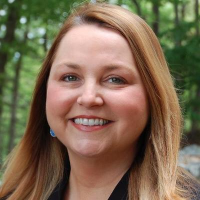
Cybersecurity In-Depth: Feature articles on security strategy, latest trends, and people to know.
Networking Without the HangoverNetworking Without the Hangover
How Sober in Cyber is redefining professional connections in the security industry.

Jennifer VanAntwerp is a seasoned marketing professional who has worked in several industries, including automotive, healthcare, and now cybersecurity. While each sector has distinct elements, VanAntwerp noticed a a common thread when attending conferences and networking events: Alcohol was a constant, and that was an issue for sober people, like herself.
"The prominence of alcohol at these events often makes it challenging for those who don't drink — whether they're sober or are abstaining for other reasons — to connect, engage, and network with their industry peers," VanAntwerp says. "I thought the community deserved to have better alternatives, where individuals could reap the benefits of professional networking with zero pressure to drink."
From this inspiration, Sober in Cyber was born in 2023. As its founder, VanAntwerp aims to provide a sober environment for the community so individuals can build professional relationships without compromising their desire to abstain from alcohol. In addition to hosting sober gatherings that emphasize fun and creative mocktails at large security conferences, another goal is to educate event organizers and team leaders about ways to integrate alcohol-free options into networking events.
"Having alcohol-free options other than water and soda pop may not seem like a big deal, but to someone who isn't drinking, it means the world," VanAntwerp says.
A New Networking Path
Sober in Cyber arrives amid the backdrop of the ever-growing "sober curious" movement, which emphasizes examining one's relationship with alcohol and drinking less or not at all, as well as drinking mindfully and choosing when and why to drink, instead of simply drinking alcohol out of habit or due to pressure.
An NCSolutions consumer sentiment survey conducted in January asked more than 1,000 Americans aged 21 or older about their opinions on drinking and alcohol trends. The data shows 41% say they intend to drink less alcohol in 2024, and reveals an overall increase in the percentage of Americans who want to drink less and try nonalcoholic beverage options.
But in the high-pressure environment of cybersecurity, a significant number are drinking in ways that may be considered unhealthy. A survey conducted by Tines that looked at mental health in the cybersecurity industry found 19% of respondents said they are consuming more than three drinks daily, which is beyond the amount recommended by the Centers for Disease Control of one drink daily for women and two for men. And a more recent recommendation from the World Health Organization suggests that no level of alcohol consumption is safe.
Tom Eston, a seasoned security professional, is one of those who is choosing mocktails over cocktails these days. Sober now for nine months, Eston chose to go alcohol-free after reevaluating his relationship with alcohol and realizing too much of his life revolved around drinking.
"I had to make a change, and I'm much happier without alcohol in my life," Eston says. "I think the biggest challenge is when others come up to you at these events and ask you 'What do you want to drink?' When I say, 'Sparkling water' or 'Can you find out what non-alcoholic options they have?' it gets awkward sometimes. When I hear 'Do you want vodka with that?' or 'Are you not drinking?' you have to respond that you don’t drink."
Alcohol as the Big Excluder
While Eston feels that, for the most part, colleagues and peers are respectful of his decision not to drink, it's navigating those awkward moments that is one of the most challenging aspects of abstaining. Jennifer Leggio, a longtime cybersecurity executive who chose to stop drinking nearly two years ago, agrees and has battled occasional sober social anxiety at conferences.
"We do so much networking around alcohol-themed events," says Leggio. "I've been left out of networking opportunities because I was told, 'Sober is boring' or 'Your sobriety makes people uncomfortable.' It can be limiting, and isolating, but none of that will or has held me back. But I know others struggle with those dynamics, so I wish they were lessened."
And at security conferences, booze can at times feel all but impossible to avoid. Eston says he quickly realized how alcohol-fueled security cons are once he stopped drinking himself and was seeking to avoid it.
"I'm much more aware of the culture around drinking in cybersecurity now," he says. "I never really paid attention to it, but every event or party at all the conferences centered around alcohol and drinking."
Eston says he has even been to conference events with no alcohol-free options and is thankful for the increasing opportunities to socialize with a mocktail through Sober in Cyber. It's a sentiment VanAntwerp hears a lot these days.
"Our in-person events are welcome to all, and many attendees just wish to have a break from the alcohol-focused events while still participating in professional networking," she says.
Spreading Beyond Conferences
Beyond her work in conferences, VanAntwerp also says Sober in Cyber has a Discord community that seen steady growth. At first launch, the server had seven members and now there are more than 70. The server hosts a monthly Happiest Hour meetup, which is a casual online hangout session to discuss topics ranging from privacy and data security to sobriety and TV shows. She is also working on co-hosting a Sober Paint & Sip party with Mental Health Hackers. And she is developing a podcast that will feature sober individuals within the cybersecurity community.
"We'll discuss their journeys into cyber and where those journeys intersect with their pathways through sobriety," VanAntwerp says.
And while VanAntwerp says the cybersecurity community has been supportive of the Sober in Cyber mission, there is still a lot of work to be done due to how ingrained alcohol is within the industry. By consistently highlighting the benefits of offering alternative options and showcasing successful events, she is starting to see perceptions slowly shift.
"By integrating these events into mainstream conference activities," she says, "we hope to redefine the professional networking landscape, making it more inclusive and enjoyable for everyone."
About the Author
You May Also Like

